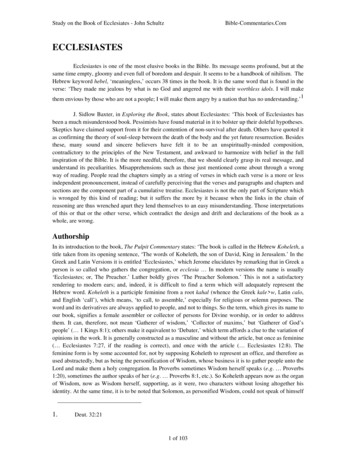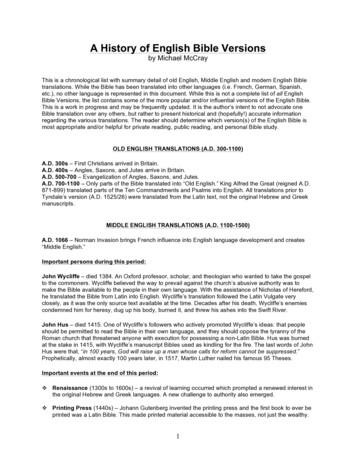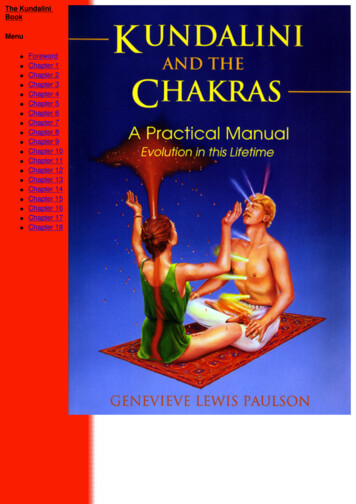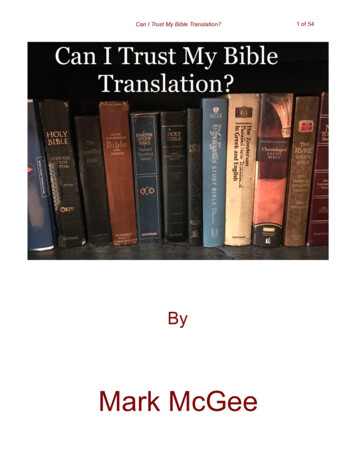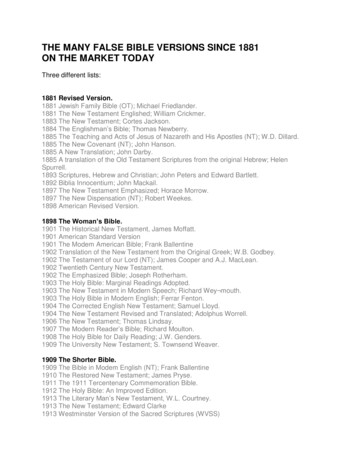
Transcription
1Commentary to the Book of Numbers - Rev. John SchultzNUMBERSCHAPTER ONEName:The New Unger’s Bible Dictionary says about the title: “The LXX title Arithmoi (numbers) wasrendered Liber Numeri in the Vulg., which appears in English as the book of Numbers or simply Numbers.The book is so designated because it makes a double reference to taking a census of the Jewish people(chaps. 1-3 and chap. 26). As was usual, the Jews named the book from its opening word wayyedabber(‘and He [Jehovah] said’), or more often from the fifth word bemidbar (‘in the wilderness’).”Synopsis of the book:We quote again from The New Unger’s Bible Dictionary: “The fourth book of the Pentateuch,continuing the redemptive history of Israel where Exodus leaves off. As Genesis is the book of origins,Exodus the book of redemption, and Leviticus the book of worship and fellowship, Numbers is the book ofthe service and walk of God's redeemed people.”Yet, the book of Numbers is basically a book of failure; failure of the people to reach the goal Godhad set with them; failure to be what they ought to have been and failure to be where God wanted them tobe. It is the book in which we read how a great nation that left Egypt as a triumphant army, is reduced to abunch of roaming Bedouins, condemned to trek around in the desert for forty years until every single one ofthem has died. The greatest failure was the failure to take seriously God’s revelation of Himself and God’spromises for them.The book starts out with God’s speaking to His people in the desert and preparing them for theconquest, both militarily and spiritually. The numbering of the people, from which the book received itsname in our English versions, is for recruitment in the army and for the service and care of the tabernacle.The people, however, are unwilling to pay a price for their freedom and dignity. They cast theirvote in favor of the slavery from which they had been delivered, because of the fish they ate and thecucumbers, melons, leeks, onions and garlic. They argue that this food was free, conveniently forgettingthat they paid for it with back breaking slave labor and that it was at the cost of their male babies, who weredrowned in the river Nile, that they ate those things. A rebellion starts in Moses’ own family, initiated byhis sister Miriam and brother Aaron. And later a large scale rebellion is started by Korah, a Levite andcertain Reubenites: Dathan and Abiram, who challenge Moses’ authority. But the greatest failure occurswhen the twelve spies, who had penetrated the promised land, return with the report that the land devoursthose living in it, that Israel does not have a change to conquer it and that the enemy they will face are“Nephilim.” This is a reference to the cryptic account of the creatures that inhabited the earth in the periodbefore the flood.1One of the saddest accounts is the one in which Moses and Aaron lose theirtemper and fail to give glory to God, when Moses strikes the rock instead of speaking to it.2 This personalfailure of the greatest man in the Old Testament makes us realize how great the damage is that sin hasincurred upon the human race. From a human viewpoint there is no hope for man. “All have sinned and fallshort of the glory of God.”3 Disobedience has robbed life of man of its value and purpose. For forty yearsIsrael roamed about in the desert, with nothing to hope for but death. Moses gave expression to this spirit ofhopelessness in his beautiful psalm:“You turn men back to dust, saying, ‘Return to dust, O sons of men.’For a thousand years in your sight are like a day that has just gone by, or like a watch in the night.You sweep men away in the sleep of death; they are like the new grass of the morning-though in the morning it springs up new, by evening it is dry and withered.We are consumed by your anger and terrified by your indignation.You have set our iniquities before you, our secret sins in the light of your presence.All our days pass away under your wrath; we finish our years with a moan.The length of our days is seventy years-- or eighty, if we have the strength; yet their span is but trouble andsorrow, for they quickly pass, and we fly away.1See Gen.6:1-4ch. 20:1-133Rom. 3:232 2002 E-sst LLC All Rights ReservedPublished by Bible-Commentaries.com Used with permission
2Commentary to the Book of Numbers - Rev. John SchultzWho knows the power of your anger? For your wrath is as great as the fear that is due you.Teach us to number our days aright, that we may gain a heart of wisdom.Relent, O LORD! How long will it be? Have compassion on your servants.”4But, although this tragedy occupies the center of this book, it is not its only message. The last tenchapters, which open with a new census of the younger generation, most of whom were not born yet whentheir parents left Egypt, is prepared to enter the land of promise. The disobedience of one man does notannul the promises of God. God remains faithful to Himself and to His Word and everyone who puts histrust in Him will not be put to shame.Quotes from commentaries:In his PREFACE TO THE BOOK OF NUMBERS, Adam Clarke writes: “This, which is thefourth book in order of the Pentateuch, has been called NUMBERS, from its containing an account of thenumbering and marshalling the Israelites in their journey through the wilderness to the Promised Land. ItsENGLISH name is derived from the title it bears in the VULGATE Latin, Numeri, which is a literaltranslation of the Greek word Arithmoi, its title in the SEPTUAGINT; and from both, our SAXONancestors called it ‘numeration.’ Why? ‘because in this the children of Israel were numbered,’ This title,however, does not properly apply to more than the first three chapters, and the 26th chapter. This book,like the preceding, takes its name among the HEBREWS from a distinguishing word in thecommencement. It is frequently called WAYª DABEER, ‘and he spoke,’ from its initial word; but in mostHebrew Bibles its running title is Bª MIDBAR ‘in the wilderness,’ which is the fifth word in the first verse.”Nelson’s Bible Dictionary gives the following outline of the book:Part One: The Preparation of the Old Generation to Inherit the Promised LandI.The Organization of Israel1:1-4:49A.B.Organization of the People 1:1-2:34Organization of the Priests 3:1-4:49II.Sanctification of IsraelA.B.C.D.Sanctification through Separation 5:1-31Sanctification through the Nazirite Vow6:1-27Sanctification through Worship7:1-9:14Sanctification through Divine Guidance9:15-10:10(1:1-10:10)5:1-10:10Part Two: The Failure of the Old Generation to Inherit the Promised Land (10:11-25:18)I.The Failure of Israel En Route to KadeshA.B.C.D.E.F.Israel Departs Mount Sinai10:11-36Failure of the People11:1-9Failure of Moses 11:10-15God Provides for Moses 11:16-30God Provides for the People11:31-35Failure of Miriam and Aaron12:1-16II.The Climactic Failure of Israel at KadeshA.B.C.D.Investigation of the Promised Land 13:1-33Israel Rebels against God 14:1-10Moses Intercedes 14:11-19God Judges Israel 14:20-38410:11-12:1613:1-14:45Ps. 90:3-13 2002 E-sst LLC All Rights ReservedPublished by Bible-Commentaries.com Used with permission
3Commentary to the Book of Numbers - Rev. John SchultzE.Israel Rebels against the Judgment of God14:39-45III.The Failure of Israel in the Wilderness15:1-19:22A.B.C.D.Review of the Offerings 15:1-41Rebellion of Korah16:1-40Rebellion of Israel against Moses and Aaron 16:41-50Role of the Priesthood17:1-19:22IV.The Failure of Israel En Route to MoabA.B.C.D.E.F.G.H.I.J.Miriam Dies20:1Moses and Aaron Fail20:2-13Edom Refuses Passage20:14-21Aaron Dies20:22-29Israel’s Victory over the Canaanites 21:1-3The Failure of Israel21:4-9Journey to Moab 21:10-20Israel’s Victory over Sihon21:21-32Israel’s Victory over Bashan21:33-35Failure with the Moabites 22:1-25:1820:1-25:18Part Three: The Preparation of the New Generation (26:1-36:13)I.The Reorganization of IsraelA.B.C.D.The Second Census26:1-51Method for Dividing the Land26:52-56Exceptions for Dividing the Land 26:57-27:11Appointment for Israel’s New Leader27:12-23II.The Regulations of Offerings and VowsA.B.The Regulations of Sacrifices28:1-29:40The Regulations of Vows 30:1-16III.The Conquest and Division of IsraelA.B.C.D.E.F.Victory over Midian31:1-54Division of the Land East of Jordan 32:1-42The Summary of Israel’s Journeys 33:1-49Division of the Land West of Jordan33:50-34:29Special Cities in Canaan 35:1-34Special Problems of Inheritance in Canaan 36:1-1326:1-27:2328:1-30:1631:1-36:13Unger’s New Bible Dictionary says, basically, the same in its introduction to the book ofNumbers, as Adam Clarke’s Commentary. The book continues “the redemptive history of Israel whereExodus leaves off. As Genesis is the book of origins, Exodus the book of redemption, and Leviticus thebook of worship and fellowship, Numbers is the book of the service and walk of God’s redeemed people.”As for the purpose of the book, Unger says: “Numbers continues the journey commenced in the book ofExodus, beginning with the events of the second month of the second year Num. 10:11 and ending withthe eleventh month of the fortieth year Deut. 1:3 . The thirty-eight years of wandering deal with thefailure of the redeemed people in the face of every divine provision for their welfare and success. The bookis typically significant in warning against the dangers of unbelief. The people disobeyed at Kadesh-barnea Num. 14 and suffered repeated defeat and eventual death in the desert (20:1-33:49).” An interesting 2002 E-sst LLC All Rights ReservedPublished by Bible-Commentaries.com Used with permission
4Commentary to the Book of Numbers - Rev. John Schultzobservation on the way Higher Criticism approaches the book, reads: “Critics who deny Mosaic authorshipdivide Numbers into P (Priestly Code) and JE (Jehovistic-Elohistic narrative). Chapters 1:1-10:28 aresupposedly a long extract from P, while JE is interwoven in the book. This criticism of Numbers, of a piecewith Pentateuchal higher criticism in general, is based upon the same erroneous philosophic, literary, andreligious presuppositions. It is a product of rationalistic skepticism that attempted to reconcile prevailingmodes of thinking of the nineteenth century with the testimony of the Mosaic books.”Part One: The Preparation of the Old Generation to Inherit the Promised LandI.The Organization of Israel1:1-4:49A.Organization of the People 1:1-2:34(1:1-10:10)The book of Numbers begins with God’s revelation of Himself. The opening verse reads: “TheLORD spoke to Moses in the Tent of Meeting in the Desert of Sinai on the first day of the second month ofthe second year after the Israelites came out of Egypt.” This is the second book of the Pentateuch in whichIsrael is found in the desert. The book of Leviticus opened with the words: “The LORD called to Mosesand spoke to him from the Tent of Meeting.” The Tent of Meeting in Leviticus may not have been the sameas the one in Numbers. We suppose that, at the opening of Leviticus, the Tabernacle had not beenconstructed yet, so the tent mentioned there was probably the one Moses had erected outside the camp.5 Itseems probable, however, that the tent mentioned in the book of Numbers was the actual Tabernacle inwhich the ark was placed. God addressed Moses one month after the completion of the Tabernacle, shortlyafter the first anniversary of the Exodus.God spoke to Moses in the desert. Deserts were not part of God’s original creation. There were nodeserts when God finished creating the earth and pronounced it very good.6 This desert was the placeMoses described as: “the vast and dreadful desert, that thirsty and waterless land, with its venomous snakesand scorpions.”7 God had never intended man to live in a desert. The desert means death, and death is thewages of sin. Yet, God speaks to man in the desert. Man may have brought death upon himself and uponGod’s creation, but God does not leave him there; He speaks to man. “He is There and He is Not Silent.”8The fact that God pitched His tent in the desert and spoke to man is typical of all of God’srevelation. John says: “The Word became flesh and made his dwelling among us.”9 The phrase “made hisdwelling” in Greek is eskeénoosen, which is derived from the word skenoo, meaning “to tent or encamp.”This world may not be fit to live in for human beings who were created in the image of God, but as we trekthrough this desert place to the land of God’s promise, He treks with us. He has pitched his tent among us,right in the center. As long as He occupies the central place of our life, our pilgrimage will end in glory.“They go from strength to strength, till each appears before God in Zion.”10 The opening words of the bookof Numbers indicate how relevant its message is for our time.The first order issued in this book is for a census to be taken of those among the Israelites who areable to serve in the army; that is “all the men in Israel twenty years old or more.”Unger’s Bible Dictionary says about this census: “This census was taken for a double purpose: (a)To ascertain the number of fighting men from the age of twenty to fifty. (b) To ascertain the amount of theredemption offering due on account of all the firstborn, both of persons and cattle. The Levites, whosenumbers amounted to 22,000, were taken in lieu of the firstborn males of the rest of Israel, whose numberswere 22,273, and for the surplus of 273, a money payment of 1,365 shekels, or five shekels each, was madeto Aaron and his sons 3:39,51 . (3) Thirty-eight years afterward, previous to the entrance into Canaan,when the total number, excepting the Levites, amounted to 601,730 males, showing a decrease of 1,870 26:51 .” There is no indication in this text, however, that people over fifty years of age were no longerrequired to serve in the army.5Ex. 33:7Gen. 1:317Deut. 8:158Title of a book by Francis Schaefer.9John 1:1410Ps. 84:76 2002 E-sst LLC All Rights ReservedPublished by Bible-Commentaries.com Used with permission
5Commentary to the Book of Numbers - Rev. John SchultzEvidently, the desert was not Israel’s only enemy. The people would be attacked by other nationsand they would have to attack other nations. But most of all, behind all human animosity is the power ofSatan. The ultimate enemy is the devil. Paul’s words are as true today as they were centuries ago: “For ourstruggle is not against flesh and blood, but against the rulers, against the authorities, against the powers ofthis dark world and against the spiritual forces of evil in the heavenly realms.”11 The life of a child of Godis not only threatened by his living conditions, but also by the hatred Satan has instilled in our fellowcreatures, who have been made in the image of God, just as we are. Not only do we live in a place that isnot fit for us to live in, we live we people with whom it is not fit to live. God counts His children, becauseHe wants them to be aware of this and He does not want us to be defenseless.As Unger’s Bible Dictionary says, the census was not merely for the purpose of conscriptingpeople into the army. It was a rather complicated affair, that served as a call to arms, but also ensured therelationship of the tribe and the individual to the tabernacle and to God Himself. The census did not givepeople a number, but an identity. It made them know who they were and where they belonged. God did notonly count them, but they counted for God. The apostle Paul says: “The man who loves God is known byGod.”It is also true that the Kingdom of God does not only consist of men of age twenty and over. Thereare, probably, more women than men in God’s army and, according to Jesus’ words, the Kingdom ofHeaven belongs to little children. When the disciples tried to keep children away from Jesus, thinking Hewas too busy to bother with them, He said: “Let the little children come to me, and do not hinder them, forthe kingdom of heaven belongs to such as these.”12 The point of this census, therefore, is not to exclude theweaker sex, or certain age groups, but to emphasize the features of watchfulness and warfare in theKingdom.We should also not think that demonstration of power always has to be met with the same kind ofpower. Although the census was, in a sense a conscription into the army, the battle never belonged to man,but to the Lord. The conquest of Canaan was not made by the power of the Israelite army. The report of thegreat campaign says: “All these kings and their lands Joshua conquered in one campaign, because theLORD, the God of Israel, fought for Israel.”13 And Joshua’s conclusion at the end of the war was: “Youyourselves have seen everything the LORD your God has done to all these nations for your sake; it was theLORD your God who fought for you.”14 The general principle that procures victory for God’s army is, inZechariah’s words: “ ‘Not by might nor by power, but by my Spirit,’ says the LORD Almighty.”15 And,finally, Jesus sums up our position in facing the enemy, with the words: “I am sending you out like sheepamong wolves. Therefore be as shrewd as snakes and as innocent as doves.”16 So, although the census waspartly meant to be a conscription into the army, it did not imply that God wants us to fight the enemy withhis own weapons. Paul says: “Do not be overcome by evil, but overcome evil with good.”17The first census is taken under the direction of Moses and Aaron, but the counting of eachindividual in every tribe is delegated to one person in each tribe, who is responsible to report back to Mosesand Aaron. We may suppose that the actual counting was entrusted to people under each of the leaders ofthe tribes. Vs. 5-15 give the names of the persons responsible in each tribe. The order of the tribes is in theorder of the birth of Jacob’s sons, first from Leah and then from Rachel. Dan was the son of Bilhah andAsher the son of Zilpah. Gad, again, was Zilpah’s son and Naphtali was Bilhah’s second son. Very littlecan be said about the names of these men. Adam Clarke’s Commentary remarks about vs. 14, regarding“from Gad, Eliasaph son of Deuel”: “This person is called Reuel, Num. 2:14 . Since the daleth (“d”) isvery much like the resh (“r”) in Hebrew, it was easy to mistake the one for the other. The Septuagint andthe Syriac have Reuel in this chapter; and in Num. 2:14 , the Vulgate, the Samaritan, and the Arabic haveDeuel instead of Reuel, with which reading a vast number of MSS. concur and this reading is supported by Num. 10:20 , we may safely conclude therefore that Dª uw’eel ., not Rª uw’eel ., was the originalreading. See Kennicott. An ancient Jewish rabbi pretends to solve every difficulty by saying that ‘Eliasaphwas a proselyte. That before he embraced the true faith he was called the son of Reuel, but that after his11Eph. 6:12Matt. 19:1413Josh. 10:4214Josh. 23:315Zech. 4:616Matt. 10:1617Rom. 12:2112 2002 E-sst LLC All Rights ReservedPublished by Bible-Commentaries.com Used with permission
6Commentary to the Book of Numbers - Rev. John Schultzconversion he was called the son of Deuel.’ Since Reuel may be translated the breach of God, and Deuelthe knowledge of God, I suppose the rabbi grounded his supposition on the different meanings of the twowords.” The men were, obviously, recognized as leaders in the tribes by the people, even before beingchosen by God. The are called in vs. 16 “the leaders of their ancestral tribes.” The KJV calls them: “princesof the tribes of their fathers.”The number of eligible people counted is recorded for each tribe, with the exception of theLevites.Vs. 46 tells us that the total number was 603,550. Most of these men will have been married and havechildren, which means that the total number of Israelites must have been close to 3,000,000 or maybe evenmore. To imagine that such a mass of people would cross the desert and even spend 40 years there, is mindboggling.The way the count is reported seems redundantly repetitious to our modern mind. With themention of every tribe the same formula is used: “All the men twenty years old or more who were able toserve in the army were counted and listed by name, one by one, according to the records of their clans andfamilies.” The phrase expresses, however, the personal and loving interest the Lord has in every individual.The census is not for the purpose of obtaining accurate statistics, but in order to make soldiers out of menwho had never fought a battle in their lives. God wants every persons to become mature and able to defendhimself in the strength and power He provides.Stripped of all repetitions the list looks as follows:Reuben 46,500.Simeon 59,300.Gad 45,650.Judah 74,600.Issachar 54,400.Zebulun57,400.Ephraim 40,500.Manasseh 32,200.Benjamin 35,400.Dan 62,700.Asher41,500.Naphtali 53,400.Total603,550.Judah is the largest contributor to the army. Even if we count Ephraim and Manasseh as one tribeas the sons of Joseph, we come only up with a total of 72,700, which is 1,900 less than Judah. We cannotcompare this to the tribe of Levi, since none of the Levites were conscripted in the army and in the count oftheir tribe the age limits are set differently.In vs. 49-54 God, not only, instructs Moses not to count the Levites in this part of the census, butHe also indicates that the Levites will occupy a different position in the placement of the tribes in relationto the tabernacle. The twelve tribes were each assigned a specific place which is specified in the nextchapter. The point here is that the Levites are assigned to form a living wall around the tabernacle. They arethe only one who are entitled to camp directly around the tent that hold the symbols of God’s revelation inthis world. We could say that the task of guarding God’s revelation was entrusted to them. “Anyone elsewho goes near it shall be put to death,” says vs. 51. This charge of the tabernacle of the Testimony to theLevites included, taking it down when it was to be moved, carrying it and setting it back up and encamparound it.There is no doubt as to where the center of the Israelite camp is: it is the Tabernacle with the arkof the Covenant. As far as we know, the Israelites were not familiar with electric energy. The presence ofthe Lord could be compare to a magnetic field of infinitely high voltage. We know that every living beingoperates on a low voltage. They dynamo of God’s presence produces an energy that is life threatening tounprotected human beings. John says about the throne of God, which he sees in the book of Revelation:“From the throne came flashes of lightning, rumblings and peals of thunder.”18 When we read that otherpeople than the Levites may not come close to the tent “so that wrath will not fall on the Israelitecommunity,” it could be taken as the danger of the magnetic field.18Rev. 4:5 2002 E-sst LLC All Rights ReservedPublished by Bible-Commentaries.com Used with permission
7Commentary to the Book of Numbers - Rev. John SchultzWe have to remember, at the same time, that what we know as electricity is only an image of thereal thing. It is an expression in material substance of a spiritual reality. Just as the light we know is avisible expression of the character of God, of which John says: “God is light; in him there is no darkness atall.”19 In reality the ark was much more dangerous to human life than the highest electrical charge. TheLevites formed a living insulation to protect the people from a divine radiation that would be fatal to theunprotected person. Their consecration did not make them immune; not even the priest or high priest wereimmune, but with the necessary precautions, they were better equipped than the non-consecrated person.But their lives were continuously in danger. The words “so that he will not die,” or “so that they will notincur guilt and die,” occur five time in the book of Exodus alone, in connection with the service of thepriests and Levites.19I John 1:5 2002 E-sst LLC All Rights ReservedPublished by Bible-Commentaries.com Used with permission
8Commentary to the Book of Numbers - Rev. John SchultzCHAPTER TWOA.Organization of the People (continued)1:1-2:34Adam Clarke Commentary quotes Scheuchzer’s Description and Plan of the Encampments of theIsraelites in the Wilderness in connection with vs. 2. He says: “The Israelitish army was divided into threeprincipal divisions. The first, which was the least in extent, but the strongest and the most powerful,occupied the center of the army: this was the throne of God, i. e., the TABERNACLE. The second, whichwas composed of the priests and Levites, surrounded the first. The third, and the furthest from the center,took in all the other tribes of Israel, who were at least about a mile from the tabernacle. For it appears fromJosephus, iii. 4, that the nearest approach they dared make to the ark, except during the time of worship,was a distance of 2,000 cubits. The reverence due to the Divine Majesty, the numerous army of theIsraelites, composed of 600,000 soldiers, with their families, which made about 3,000,000 souls, naturallydemanded a considerable extent of ground. We are not to imagine that all these families pitched their tentspell mell, without order, like beasts, or as the troops of Tartary, and the eastern armies; on the contrary,their camp was divided according to the most exact rules. And we cannot even doubt that their camp waslaid out, and the place of every division and tribe exactly assigned by some engineers, or geometricians,before the army stopped to encamp, in order that every person might immediately find his own quarter, andthe road he ought to take to reach the other tents.”This gives us an impression of the efficiency of the organization of the people. Each tribe knew itsexact place in relationship to the tabernacle and the exact distance at which to pitch their tents. They alsoknew the marching order when they broke up camp. Nobody rushed around in confusion, trying to find arandom place. Each tribe had a standard with the banner of the tribe to which each member of the triberallied. Not much is known about the banners of the different tribes. Matthew Henry’s Commentary says onthis point: “Many of the modern Jews think there was some coat of arms painted in each standard, whichhad reference to the blessing of that tribe by Jacob. Judah bore a lion, Dan a serpent, Naphtali a hind,Benjamin a wolf, etc. Some of them say the four principal standards were, Judah a lion, Reuben a man,Joseph an ox, and Dan an eagle, making the appearances in Ezekiel’s vision to allude it. Others say thename of each tribe was written in its standard. Whatever it was, no doubt it gave a certain direction.” Theallusion to Jacob’s last word spoken to his sons before his death, in Gen. 49, is a plausible one.Judah’s position is the first one mentioned, which means that they were the first ones to break upand follow immediately after the ark and the tabernacle. All translations agree that the tribe’s place was “onthe east, toward the sunrise.” It may seem nit-picking, but this phrase does not automatically imply that thesun actually rose from the east in the time Israel trekked through the desert. The Hebrew words areQeed amaah mizraachaah, which, according to Strong’s definition means: qedem, “the front, of place(absolutely, therefore part, relatively the East)” and mizrach, “sunrise i.e.: the east.” So, literally it onlysays: “In front toward the east.” The reason we mention this a book by Emanuel Veliskovsky, Worlds inCollision, in which he advances the theory that the rotation of the earth was reversed around the time of theExodus by the coming of Venus into our solar system as a comet. The book gives some very interestingexplanations about some of the extraordinary phenomena recorded in Joshua, like the standing still of thesun.20 The fact that the author does not bring any Christian bias or any inclination to lean toward inspirationof the Scriptures into his hypothesis, add a good deal of weight to his arguments. We only want to indicatethat the Hebrew text of Num. 2:3 does not necessarily prove him wrong.The closest distance a tribe was to be from the tabernacle, according to Josephus was 2000 cubits.A cubit being approximately 18 inches, this would be about 3000 foot, or 900 meters.In the light of the history of salvation as a whole, it is not amazing that Judah was the first tribe tolead the army. Judah was God’s chosen tribe for the purpose of bringing our Savior into the world. Jacobhad prophesied about Judah: “The scepter will not depart from Judah, nor the ruler’s staff from between hisfeet, until he comes to whom it belongs and the obedience of the nations is his.”21 In Jacob’s wordsaddressed to Judah, he is compared to a lion. In Revelation our Lord Jesus Christ is called “the Lion of thetribe of Judah.”22 And, although Judah followed the tribe of Levi who carried the ark and the tabernacle, theLion of Judah becomes the leader when the images are replaced with the reality. The epistle to the Hebrews20Josh. 10:12-14Gen. 49:1022Rev. 5:521 2002 E-sst LLC All Rights ReservedPublished by Bible-Commentaries.com Used with permission
9Commentary to the Book of Numbers - Rev. John Schultzspeaks about a change in priesthood. We read: “For when there is a change of the priesthood, there mustalso be a change of the law. He of whom these things are said belonged to a different tribe, and no one fromthat tribe has ever served at the altar. For it is clear that our Lord descended from Judah, and in regard tothat tribe Moses said nothing about priests.”23For the purpose of our study it is of little use to go into detail as to the placement of the varioustribes in their relation to the tabernacle. Adam Clarke draws a comprehensive diagram in his Commentary,which gives the position of each tribe and the number of conscripted men. I have been unable to copy itdirectly from the bible program to my word processor. It looks approximately like this:EN---- -----SDIAGR
Unger’s New Bible Dictionary says, basically, the same in its introduction tothe book of Numbers, as Adam Clarke’s Commentary. The book continues “the redemptive history of Israel where Exodus le


